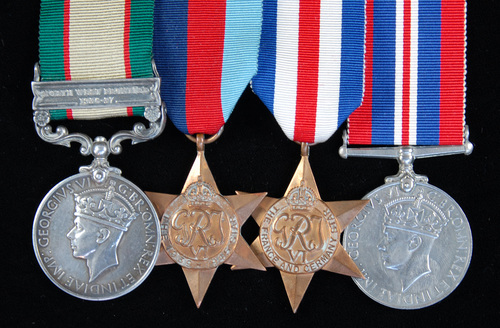
Auction: 15002 - Orders, Decorations, Campaign Medals and Militaria
Lot: 320
A Most Unusual Second War Campaign Group of Four to Lancaster Rear-Gunner, Flight Lieutenant R.H. Davis, Royal Air Force, Late Royal Artillery, Who Carried Out At Least 20 Operational Sorties, Claiming 1 Me. 110 Shot Down, Prior to Returning to His Pre-War Employment as A Prison Guard; He Was Subsequently Employed As British Chief Officer at Spandau Prison, Berlin, Where He Was Personally Responsible For Rudolf Hess
India General Service 1936-39, one clasp, North West Frontier 1936-37 (4030740 Bmbr. R. Davies [sic]. R.A.); 1939-1945 Star; France and Germany Star; War Medal, generally very fine, with the following related original items and documents:
- Recipient's Identity Tags; Royal Artillery Cap Badge; H.M. Prisons Cap Badge
- Regular Army Certificate of Service
- R.A.F. Flying Log Book For Navigators, Air Bombers, Air Gunners, Flight Engineers (22.4.1944-17.6.1946)
- Army Certificate of Education First Class, dated 14.10.1936; Army Certificate of Education Second Class, dated 27.11.1930
- Corps of Military Police, School of Instruction, Course Certificate, dated 5.11.1934
- Furlough Certificate, dated 17.3.1937
- Two photographs of recipient in R.A.F. uniform
- A five paged autobiographical typed account of recipient's service, written February 2002; Correspondence from recipient with regard to claiming his Second War Campaign Medals, April 1970 (lot)
Flight Lieutenant Roland Henry Davis (1910-2002); born Highley, Shropshire; the son of a coal miner, he was employed by the Highley Mining Company as a pit-pony driver; initially joined the Territorial Army in 1928, before transferring for service with the Royal Artillery, August 1929; having served in India, he purchased his discharge in 1937; he was employed by H.M. Prison Service, from January 1938; he saw service at Wakefield and Parkhurst Prisons, before moving to Winson Green, Birmingham, April 1940; as a reserved occupation he was exempt from military service; despite this he volunteered for service with the Royal Air Force, October 1943; he was selected for training as an Air Gunner, and carried out his training at No. 3 A.G.S. and No. 26 O.T.U.; after postings to 1657 Conversion Unit and No. 3 L.F.S., he was posted as a Rear Gunner for operational flying to 622 Squadron (Lancasters), Mildenhall, Suffolk, January 1945; he flew in 20 operational sorties with the Squadron, including: Wanne Eickel (2); Munchen Gladbach; Weisebaden; Gelsenkirchen (2); Dessau, 7.3.1945, 'Shot Down Me.110' (Log Book refers); Detteln (2); Dortmund (2); Hamm; Bocholt; Berlin; Heligoland; Regensburg; Rotterdam and The Hague (2); he adds the following, 'On one or two of these raids we saw neither enemy planes, anti-aircraft fire, or other signs of life and it sometimes appeared as if we were bombing a ghost town. On other occasions the anti-aircraft fire was so heavy and dense that Jack [a crew member] sometime remarked it was thick enough to walk on. Which meant we sometimes returned to base with the fuselage riddled with shrapnel holes of varying sizes. On one raid a heavy ack-ack shell came up through the tail plane but for some reason failed to explode, if it had done so we would have been blasted out of the sky in very small pieces' (typed autobiographical notes included in lot refer); he also undertook five flights repatriating British POW's 9th-29th May; commissioned Flying Officer, April 1945; carried out training as an Air Traffic Control Officer, and served as Acting Flight Lieutenant in Cairo and Naples prior to his discharge in September 1946; he returned to the Prison Service at Birmingham, 'I had not been home long when I was sent to work in a German prison where we held all the German Field Marshals, Generals, and other high ranking officers who had been sentenced to long terms of imprisonment for war crimes.... I returned home and for a few years was Deputy Governor of Lincoln Prison from where I was eventually sent to Spandau Prison in Berlin where the prisoners were held who were sentenced by the Nuremburg War Trials, and from where I finally retired in 1978' (Ibid); Davis was employed as British Chief Officer at Spandau, and it was here that he guarded his most infamous prisoner Rudolf Hess; in his 'two years at Spandau, Roland got to know Hess very well: 'He could speak perfect English and quite a few other languages... I used to sit on his bed and talk to him. He was a highly intelligent, courteous, old man. He was always absolutely loyal to Hitler and he would never say a word against him.' (Newspaper cutting included with lot refers).
Subject to 20% VAT on Buyer’s Premium. For more information please view Terms and Conditions for Buyers.
Sold for
£520




